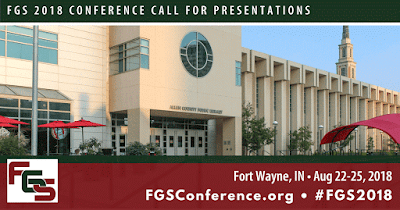We are very excited to announce that presentation proposals are now being received for the FGS 2018 Conference, “On the Three Rivers—Past, Present & Future” to be held 22-25 August, in Fort Wayne, Indiana. The conference will be held in conjunction with the Allen County Public Library as local host. Outstanding nearby research facilities and attractions will enhance the conference experience. The deadline for submission of lecture proposals is Friday, 14 July 2017.
The program committee specifically seeks new and dynamic proposals that will provide exceptional and unique educational experiences for conference attendees. Proposals for workshops and sponsored talks are also encouraged. Categories for submissions include:
· Society Management
· Methodologies and Strategies
· Transportation
· Midwestern Records
· Military Records
· Repositories
· Record Types
· Technology
· Religious Groups
· Ethnic Groups
· Genetics and DNA
· Migration/Immigration
Please note that there are approximately 130 slots to fill and we are looking for presenters that can give talks on multiple topics. Speakers are encouraged to submit 6 or more presentations for the committee to consider. The committee reserves the right to contact presenters for more details and/or clarification of submission.
Submission Requirements
Each proposal should include:
· Speaker(s) name.
· Speaker(s) contact information, including mailing address, phone, email, and website, if applicable.
· Prior speaking experience.
· Speaker(s) biography.
· Speaker(s) brief brochure biography (40 word maximum).
· Lecture title (not to exceed 12 words).
· Lecture brochure description (50 word maximum).
· Lecture outline/summary.
· Lecture audio-visual requirements. FGS does NOT provide projectors, computers, or internet access for speakers.
Proposals should be submitted online at: https://www.fgsconference.org/fgs2018-call-for-presentations/
Submissions are due no later than 14 July 2017.
Compensation
Selected speakers receive an honorarium, travel compensation, and conference registration as well as per diem and hotel nights based on the number of lectures presented. (Sponsored speakers only receive conference registration and syllabus materials. See more about sponsorships below.) Non-sponsored speakers receive compensation according to the FGS Conference Speaker Policy.
Sponsored Lectures
Societies and businesses are encouraged to submit proposals for sponsored talks. The sponsoring organization will cover its speaker's costs to present the lecture. Sponsored speakers will abide by all speaker deadlines and syllabus requirements. Sponsored speakers will receive complimentary FGS conference registration.
Invitations to speak will be issued in October 2017. Syllabus format guidelines and deadline will be sent to speakers at that time. The deadline for acceptance and submission of signed speaker contracts is 1 November 2017.
Email questions to program2018@fgs.org.



